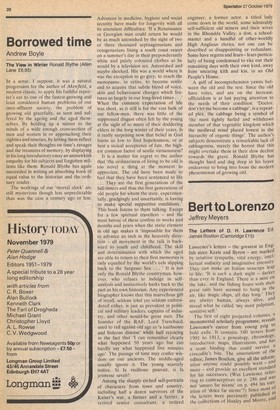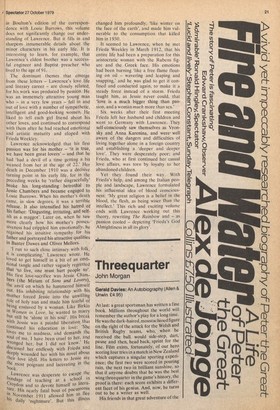Bert to Lorenzo
Jeffrey Meyers
The Letters of D. H. Lawrence Ed. James Boulton (Cambridge 215) Lawrence's letters — the greatest in English since Keats and Byron — are marked by intuitive sympathy, vital energy, intellectual audacity and imaginative intensity. They can make an Italian seascape leaP to life: 'It is such a dark night — darker than ever in England. There is a mist on the lake, and the fishing boats with their great sails have seemed to hang in the air, like magic ships, all day long.' They are always human, always alive, and reveal what he called 'my most palpitant, sensitive self.'
The first of eight projected volumes, a monumental scholarly programme, reveals Lawrence's career from young Prig to hold exile. It contains 580 letters from 1901 to 1913, a genealogy, chronologY, introduction, maps, illustrations, and has a stout binding that could survive a crocodile's bite. The annotations of the editor, James Boulton, give all the information anyone could possibly want — and more — and provide an excellent standard for his successors. (Was Lawrence referring to contraceptives on p. 286 and Was not 'amaro far niente' on p. 494 his variation of `dolce far niente'?) Since most (.14. the letters were previously published 19 the collections of Huxley and Moore, an
in Boulton's edition of the correspondence with Louie Burrows, this volume does not significantly change our understanding of Lawrence. But it fills in and sharpens innumerable details about the minor characters in his early life. It is interesting to learn, for example, that Lawrence's eldest brother was a successful engineer and Baptist preacher who lived to the age of 91.
The dominant themes that emerge from these letters — Lawrence's love life and literary career — are closely related, for his work was produced by passion. He was an immensely attractive young man who — in a very few years — fell in and out of love with a number of sympathetic, intelligent and good-looking women. He liked to tell each girl friend about his other loves, and continued to correspond with them after he had reached emotional and artistic maturity and eloped with Frieda Weekley.
Lawrence acknowledged that his first passion was for his mother — 'it is true, we have been great lovers' — and that he had 'had a devil of a time getting a .bit weaned from her at the age of 22.' Her death in December 1910 was a decisive turning point in his early life, for in the Preceding weeks he 'rather disgracefully' broke his long-standing betrothal to Jessie Chambers and became engaged to Louie Burrows. When his mother's death came, in slow degrees, it was a terrible release, It also intensified his hatred cif his father: 'Disgusting, irritating, and Selfish as a maggot'. Later on, when he saw more clearly how his mother's possessiveness had crippled him emotionally, he regained his intuitive sympathy for his father and portrayed his attractive qualities in Baxter Dawes and Oliver MeHors, 'I run to such close intimacy with folk, it is complicating,' Lawrence wrote. He 1°ved to get himself in a bit of an en16tional tangle and rather vaguely regretted that 'to live., one must hurt people so'. His first love-sacrifice was Jessie Chambers (the Miriam of Sons and Lovers), the anvil on which he hammered himself °tn. His inhibiting relationship with his Mother forced Jessie into the unwilling role of holy nun and made him fearful of being enslaved by a woman. Like Birkin in Women in Love, he wanted to marry but still be 'alone in his soul'. His break With Jessie was a painful liberation, lhat continued his education in love: 'She loves me to madness, and -demands the soul Of me. I have been cruel to her, and wronged her, hut I did not know.' He discussed her endlessly with Frieda and
their lovewounded her with his novel about love idyll. His letters to Jessie are Ile most poignant and lacerating in the book .
Lawrence was desperate to escap.e the bondage of teaching at a school in Croydon and to devote himself to litera!Lire. His nearly fatal bout of pne um onia In November 1911 allowed him to flee his daily , h., illness nightmare . But t Is
changed him profoundly, 'like winter on the face of the earth', and made him vulnerable to the consumption that killed him in 1930.
It seemed to Lawrence, when he met Frieda Weekley in March 1912, that his entire life had been a preparation for this aristocratic woman with the Rubens figure and the Greek face. His emotions had been burning 'like a free flame floating on oil — wavering and leaping and snapping,' and he was glad to get it confined and conducted again, to make it a steady force instead .of a storm. Frieda taught him, as Jessie never could, that 'love is a much bigger thing than passion, and a woman much more than sex.'
Six weeks after their first meeting Frieda left her husband and children and went to Germany with Lawrence, They self-consciously saw themselves as Vronsky and Anna Karenina, and were. well aware of the dangers and difficulties of living together alone in a foreign country and establishing a 'deeper and deeper love'. They were desperately poor; and Frieda, who at first continued her casual love affairs, was torn by loyalty to her abandoned children.
Yet they found their way. With Frieda's help, and among the Italian people and landscape, Lawrence formulated his influential idea of blood consciousness: 'My great religion is a belief in the blood, the flesh, as being wiser than the intellect.' This rich and exciting volume ends with Lawrence working out this theory, rewriting The Rainbow arid — as passion cooled — depicting 'Frieda's God Almightiness in all its glory'.



































 Previous page
Previous page